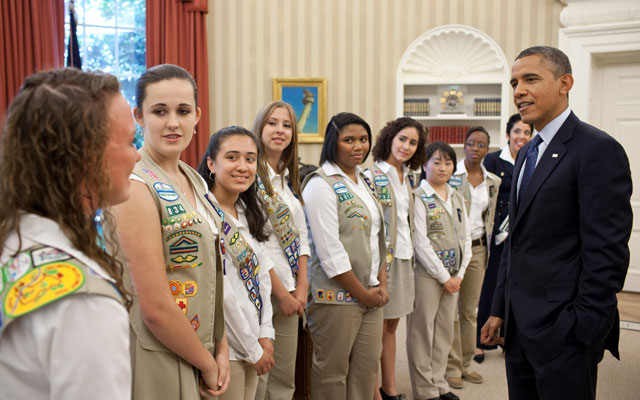Girl Scouts “Tag Along” with Common Core
Lindsey Burke /
Thin Mints and Tagalongs might be a little hard to swallow now for those concerned with centralization of education—and now, civil society institutions.
The Girl Scouts of America now boasts that every merit badge is fully aligned with the Common Core State Standards Initiative—an effort to nationalize the content taught in every public school across the country. The Girl Scouts’ website states in part: “The content of all Girl Scout national proficiency badges and journeys have been correlated by grade level to national Common Core Standards, 21st Century Skills standards, [and] Financial Literacy education standards.”
The Girls Scouts might want to design a badge for understanding big government while they’re at it.
The Obama Administration has heavily incentivized the adoption of Common Core national standards. When the National Governors Association and the Council of Chief State School Officers crafted the standards for English language arts and mathematics back in early 2009, the Obama Administration quickly began incentivizing the adoption of the standards through grants and No Child Left Behind waivers.
The major concern with Common Core is that it further entrenches the federal government into what is taught in our nation’s schools. We’ve seen creeping federal intervention into education for the past four decades, and such intervention is a zero-sum game: Every inch the federal government takes comes at the expense of state and local control of education.
Yet that creeping federal intervention has now made its way not only into the nation’s public schools but into its civil society institutions such as the Girl Scouts.
Imposing Common Core national standards on the merit badge system appears a far cry from the 100-year-old organization’s original purpose. The organization was originally founded in 1912 to bring girls “into community service and the open air.… Girls Scouts hiked, played basketball, went on camping trips, learning how to tell time by the stars, and studied first aid.”
By contrast, the Common Core standards’ suggested reading list directs students to read government manuals and executive orders.
The Girl Scouts—and states throughout the country—should eschew this push for standardization. State leaders in particular now have the opportunity to reject this centralization, jump off the national standards bandwagon, and work to strengthen their former state standards to better serve the unique needs of students in their states.
Uniformity and centralization are the antithesis of what we know works in education: choice and competition. Policymakers interested in improving educational outcomes should not take the national standards bait and should instead be pushing for robust and expansive educational choice options for all families, allowing parents to choose schools that use a curriculum that meets their children’s unique learning needs.
For their part, the Girl Scouts of America can earn a merit badge in educational freedom by rejecting this push for uniformity and teaching about the merits of choice, competition, and independent thinking.

